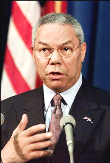Powell ‘disappointed’ US stands alone on Darfur genocide determination
 WASHINGTON, Sept 29 (AFP) — US Secretary of State Colin Powell told AFP that he was “disappointed” in the failure of other nations to join the United States in declaring that genocide is underway in Sudan’s troubled western region of Darfur.
WASHINGTON, Sept 29 (AFP) — US Secretary of State Colin Powell told AFP that he was “disappointed” in the failure of other nations to join the United States in declaring that genocide is underway in Sudan’s troubled western region of Darfur.
Such a determination would have significantly boosted pressure on the Sudanese government to stop pro-Khartoum Arab militias from conducting a campaign against Darfur’s indigenous black African population that Powell termed “genocide” earlier this month, he said in an interview.
“My disappointment is that I wish other people would have come to the conclusion that we did that it constitutes genocide,” Powell said. “Maybe that would have ratcheted up more pressure on the regime.”
“It doesn’t generate any additional action, it generates additional political pressure and elevates the degree and seriousness of the rhetoric, but everybody ought to be doing what they can no matter what you call it,” he said.
Powell, who made the genocide determination on September 9, noted that the European parliament had described the situation in Darfur as “genocide” but lamented in particular that others have not.
Although Germany’s defense minister has used the term, no other country has offered a similar assessment. The latest UN Security Council resolution on Darfur calls simply for an investigation into whether genocide is occurring.
According to the United Nations, some 50,000 people have been killed and 1.4 million driven from their homes in the 19-month conflict that began when rebels rose up against Khartoum to demand an end to alleged marginalization of their region — populated mainly by black Africans.
The Sudanese government responded by giving the Arab militias, known as the “Janjaweed,” free rein to crack down on the rebels and their supporters.
Sudan denies genocide is underway but has grudgingly accepted the demands of the UN Security Council, which on September 18 called for Khartoum to rein in the militias and provide security and aid distribution to allow displaced people to return to their homes.
It also requires the government to prosecute militia and security force commanders responsible for the grosser abuses in the government’s clampdown, which human rights groups say include the wholesale destruction of minority villages and systematic resort to rape as a weapon.
Sudan on Wednesday bowed to pressure and agreed to allow African Union forces to monitor the activities of its police in camps for displaced persons in the region, its first concrete action toward implementing the requirements of the resolution.
In the interview, Powell said the international community’s priority should be on supporting the dispatch of 3,000 to 4,000 AU troops to supplement the small number of African monitors now on the ground.
“The most important thing we need to be focusing on now … is providing the wherewithal for the AU to dispatch additional forces to the region to serve as monitors and protectors of monitors. I think that very presence will deter a lot of what’s happening,” he said.
International humanitarian agencies operating in the region say despite that earlier pledges by the government to stabilize the security situation, abuses, including rape, continue.
Sudan had until recently resisted calls to boost the size of the AU force in Darfur, fearing a larger military presence would automatically transform it into a peacekeeping force, which Khartoum opposes.
The government argues that it alone is responsible for policing the region and maintaining law and order, insisting that an AU force with a broader mandate would further complicate the situation in Darfur.
